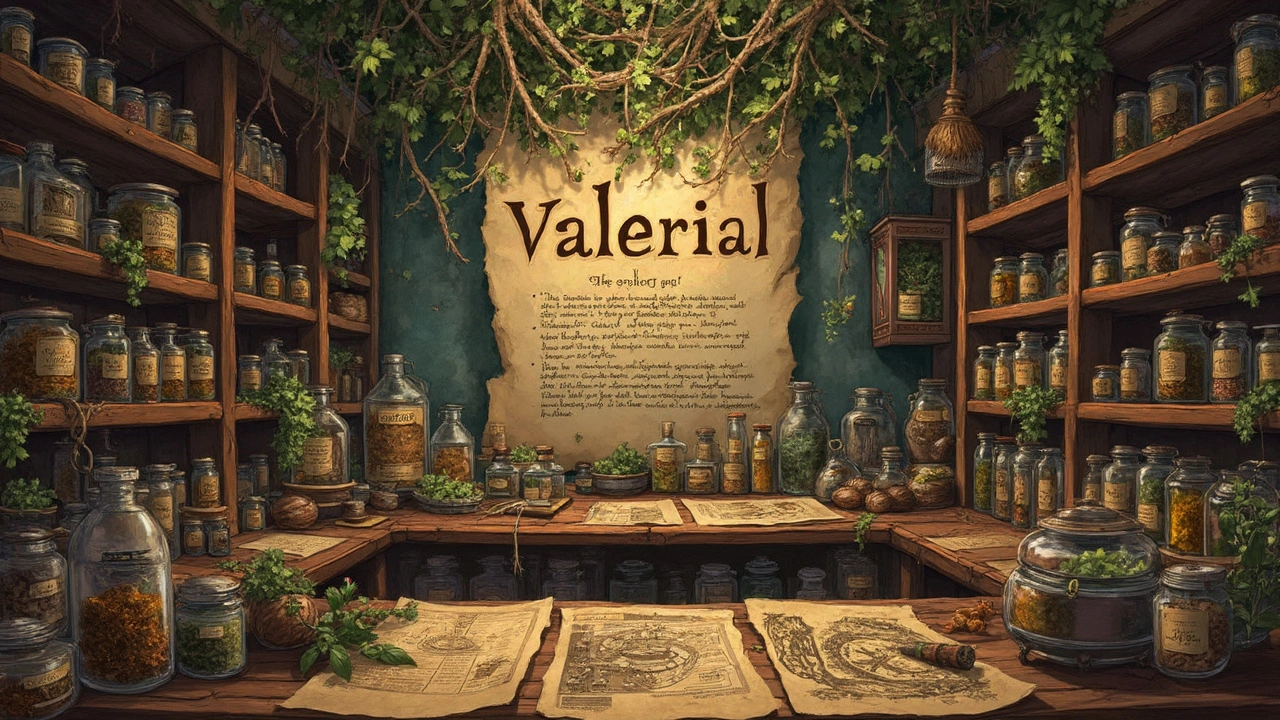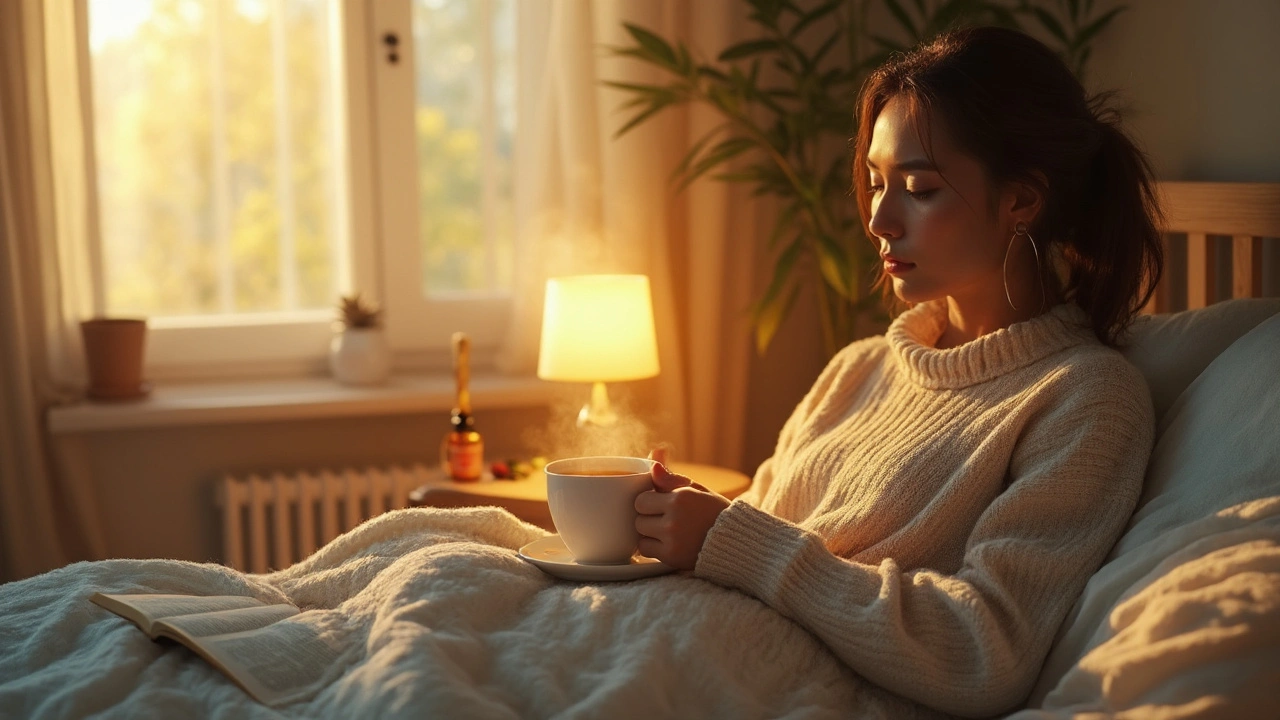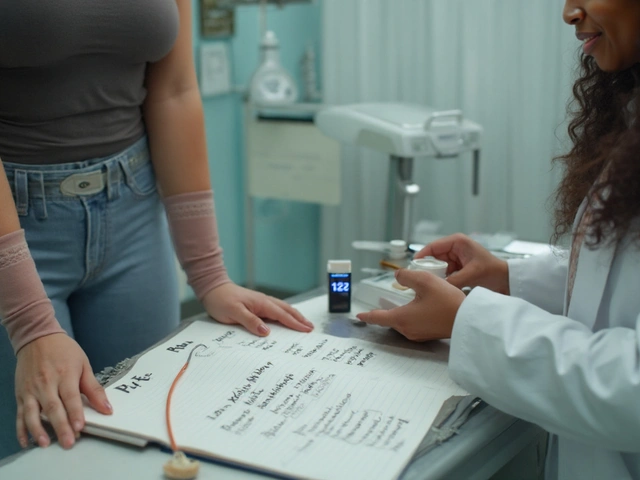If you're tossing and turning at night or find life's pressures bubbling over, valerian root might just be your new best friend. It's an ancient remedy, long prized for its calming properties. Why is it so special? Well, this humble root can offer a natural solution to both stress and sleep problems.
Ever wonder why so many people swear by it? The root contains compounds that interact with your brain to ease stress and promote relaxation. Imagine drifting into peaceful sleep without the hangover effect of sleeping pills. Sounds dreamy, right?
Before grabbing a bottle, let's dive into what makes valerian root tick. Is it safe? How should you take it? Keep reading, and you'll get practical answers to these questions and unlock the full potential of valerian root in your daily routine.
Introduction to Valerian Root
Valerian root has been used for centuries to help with everything from sleep problems to keeping your cool in stressful situations. This potent natural remedy comes from the valerian root plant, also known as Valeriana officinalis, which is native to Europe and parts of Asia. It's the underground part of the plant that holds the magic.
What's so special about it? Well, this root is packed with compounds like valerenic acid, isovaleric acid, and a bunch of antioxidants. These components work together to interact with GABA, a neurotransmitter in the brain, which helps calm down nerve activity. That's why it can be a real lifesaver for stress relief and beating sleep issues.
Before modern medicine hit the scene, people turned to valerian root for all sorts of ailments. Today, it's gaining traction as a go-to natural remedy—especially for those wary of side effects from typical over-the-counter meds.
Forms and Usage
Valerian root is pretty versatile; you can find it in various forms such as teas, capsules, or tinctures. Each form has its pluses, but the choice really depends on what suits your lifestyle and needs.
- Tea: Valerian tea is simple to prepare and offers a soothing bedtime ritual.
- Capsules: Great for convenience, especially if you're always on the go.
- Tinctures: These are concentrated, so a few drops are typically enough.
Whether you're looking for stress relief or better sleep, valerian root might be worth trying. Always remember, though, if you're on other medications or have specific health concerns, it's a good idea to chat with a healthcare pro first to make sure it's the right fit for you.
How it Works for Stress
Ever found yourself in a spiral of anxiety after a hectic day? You’re not alone. Fortunately, valerian root might be just the thing that helps turn down the volume on stress. But how exactly does it work?
Getting Into the Brain
Valerian root is believed to boost the levels of a chemical called gamma-aminobutyric acid (GABA) in the brain. Simply put, GABA is like a natural sedative for your nervous system. It works by calming down nerve transmissions, helping you to relax.
A Natural Stress Buster
People often ask, ‘Why choose valerian root over other remedies?’ Well, it's all about the balance. Unlike some over-the-counter medicines that might leave you feeling groggy, valerian offers a gentle touch. Plus, it avoids the rollercoaster of side effects that you might face with synthetic options.
Studies Say So
The good news is, there’s some solid science backing this up. A study conducted by a group of researchers found that participants reported noticeable stress relief after taking valerian root supplements over a few weeks. Check out this cool stat from the study:
| Duration (Weeks) | Percentage of Participants Feeling Stress Relief |
|---|---|
| 2 | 40% |
| 4 | 65% |
Pretty impressive, right? It’s a clear sign that this natural remedy means business.
Tips for Youself
To make the most of valerian root, think about combining it with simple lifestyle changes like practicing mindfulness or getting enough sleep. Together, these steps can create a powerhouse of calm in a world that often feels rushed.
Remember, it's always a good idea to check with a healthcare professional, especially if you're considering it as part of your stress-busting toolkit. A little extra care goes a long way.

Valerian and Sleep Disorders
Ever hear of Valium's natural cousin? Yep, that's the gist when it comes to valerian root and its soothing effects on sleep. People have been leaning on it for ages, especially when bedtime feels like a battle. The magic lies in its natural remedy to modern insomnia.
Why Does It Work?
Inside the valerian root are compounds like valerenic acid and isovaleric acid. These darlings balance your neurotransmitters, particularly GABA, calming down that overactive mind of yours. Plus, no synthetic chemicals here; you're getting the benefits straight from nature.
Effectiveness: What Studies Say
Some studies suggest that downing valerian root before bed can reduce the time it takes to fall asleep. Picture this: a 15% dip in the time you spend staring at the ceiling, wondering why sheep-counting never did the trick.
How to Use Valerian Root for Sleep
- Tea: Brewing valerian tea about 30 minutes before hitting the sheets can be relaxing. Let it steep for 5-10 minutes for full effect.
- Capsules: Not a tea fan? Capsules are easy and no-fuss. Look for standardized extracts for quality.
- Tinctures: Few drops under the tongue work wonders if you're desperate for some shut-eye.
Getting the Most Out of It
Optimal results are often noticed after a few weeks of consistent use. Instead of stopping when you first notice improvements, give your body time to adjust. Pair it with a nighttime ritual to cue your brain that it's time to unwind. And remember, moderation is key—overdoing it can have the opposite effect.
Isn't it comforting to know there's a natural ally in your quest for better sleep? Give valerian root a try and snooze like you mean it.
Tips for Use
Getting the most out of valerian root involves knowing how to use it properly. Whether you're aiming to reduce stress or improve your sleep quality, a little guidance goes a long way.
Choosing the Right Form
Valerian root comes in various forms like capsules, teas, and tinctures. If convenience is your thing, capsules might be your best bet. They're easy to dose and can be taken quickly. For those who prefer a soothing ritual, brewing valerian tea can be a calming evening routine. Tinctures offer flexibility in dosage if you prefer more control over the amount.
Timing Your Dosage
When it comes to tackling sleep disorders, timing is crucial. For sleep, consider taking valerian about 30 minutes before hitting the hay. It gives the root time to work its magic. For stress relief, you might find taking a smaller amount during the day helps keep the edge off without making you drowsy.
Start with the Right Amount
Starting small is key. With capsules, a typical dose ranges between 300 to 600 mg. For tea, one cup before bedtime often suffices. Tincture users can start with a teaspoon in water, adjusting as needed based on their body's response.
Spot Side Effects
Although valerian is generally safe, some might experience mild headaches or digestive upset. Listen to your body. If something feels off, it's wise to adjust the dose or check in with a healthcare provider, especially if you're pregnant, nursing, or on medication.
Valerian root Compatibility
Combining valerian with other calming herbs like chamomile or lavender can enhance its effects. Just steer clear of mixing it with alcohol or sedatives, as this might cause excessive drowsiness.
Use it thoughtfully, and valerian can be a valuable companion in managing stress and sleep issues naturally.




chris macdaddy
July 17, 2025 AT 22:43I've tried valerian root a couple of times when dealing with sleep issues, and honestly, it worked better than I expected.
It's kinda funny how an ancient herb can sometimes be more effective than the modern meds people usually reach for.
But it's important to note that it doesn’t knock you out like strong sleeping pills; instead, it feels like it gently calms the mind and body.
One thing I wish more people understood is the timing of taking valerian root—taking it too early or too late in the evening might reduce its effectiveness.
Also, I’m curious how it stacks up against other natural remedies like chamomile or lavender. Anyone got solid experiences or studies to share?
Overall, this post makes me want to use valerian root more deliberately rather than sporadically.
Hope others find this insight useful. Peace!
Abby VanSickle
July 18, 2025 AT 15:40This article offers a fresh perspective on valerian root, but I believe we need a more rigorous scientific evaluation of its efficacy.
Herbal remedies often get hyped without sufficient data backing their claims—stress management and sleep disorders are complex issues that vary widely per individual.
Its interaction with other medications or underlying health conditions is something that people should really be cautious about.
That said, I appreciate the natural approach, especially for those who want to avoid dependency on pharmaceuticals.
But let's not treat valerian root as a cure-all. It's a piece of the puzzle, maybe, but certainly not the whole solution.
What does everyone else think about relying on natural versus synthetic remedies for serious sleep disorders?
Moumita Bhaumik
July 21, 2025 AT 11:30Honestly, I’m skeptical whenever I see articles glorifying some 'miracle' natural herb like valerian root.
We live in an era where natural supplements are a booming business, and sometimes, the science is cherry-picked or conveniently ignored.
There’s always an underlying agenda—big pharma or herbal companies pushing products.
Stress and sleep issues are very personal and complex; I doubt any one root alone can solve them.
I want solid proof, real clinical trials, and unbiased studies. Until then, I’ll remain cautious with these 'natural remedies.'
Just my two cents, but be mindful of where you get your information from.
Sheila Hood
July 23, 2025 AT 11:30Why does everyone rave about valerian root like it’s some magic potion? The reality isn't always rosy.
I've known folks who tried it, only to experience headaches, dizziness, or even the opposite effect—anxiety.
Natural doesn't automatically mean safe or effective.
Plus, the dosage and preparation vary a lot, which can lead to inconsistent results.
This article glosses over potential side effects and user variability, which is crucial info in my opinion.
I'm all for natural aids, but they should be approached with a healthy dose of skepticism.
Kathy Butterfield
July 23, 2025 AT 14:00I've been using valerian root tea for a few months now, and honestly, it’s become a part of my nightly bedtime ritual. 🌿💤
It does seem to reduce my stress levels and helps me unwind after a hectic day.
What I love most is how it's gentle and non-habit forming, unlike prescription sleep meds.
Plus, the earthy smell and taste take me back to some cozy herbal market vibes.
Anyone else here a fan of the tea form as opposed to capsules or tinctures? I find it relaxing beyond just the sleep benefits.
Also, a fun tip: combining valerian with a little chamomile can create a lovely synergy for calmness.
Melissa Jansson
July 26, 2025 AT 02:20Okay, let's get real here—valerian root is hyped way too much, and the language around it is so over the top it makes me cringe.
‘Wonders for mental well-being’? Give me a break. There’s anecdotal chatter, and then there’s actual evidence.
This kind of jargon-heavy fluff does a disservice to readers who are genuinely seeking help.
Not that I’m against natural remedies, but drop the melodrama and offer clear, concise, and balanced information instead.
Plus, the whole ‘ancient herb’ angle is such a trope now. Lots of ancient remedies didn’t hold up under modern scrutiny.
At least the article did touch on practical usage, but it could be way more straightforward.
Max Rogers
July 26, 2025 AT 20:20Great post! Valerian root is one of those natural remedies that’s garnered a lot of interest, and it’s good to see a well-rounded overview.
From a grammatical perspective, the article is well-structured and fluid, making it easy to follow.
One thing I think could be expanded is the comparison with other natural remedies like melatonin or passionflower—people often want a side-by-side of effectiveness and potential downsides.
Also, a little more about dosage guidelines and any potential contraindications might help readers use valerian safely.
Overall, I appreciate the blend of scientific explanation and practical tips.
Hope to see more articles like this that combine accuracy with accessibility!
Faye Bormann
July 29, 2025 AT 12:40Now, if you ask me, the whole fascination with valerian root is part of some bigger obsession with finding quick fixes for lifelong issues.
Sure, stress and sleep disorders are tough, but expecting a simple root to 'stand out' in the realm of natural remedies smacks of fantasy.
What about lifestyle changes, mindfulness, or therapy? Those are often overlooked in favor of something you can pop in a capsule.
This article glosses over the complexity of real human mental health, which is frankly irritating.
I get the appeal of natural stuff, but let's not kid ourselves into thinking it’s a panacea.
Anyone else find this kind of narrative a bit reductionist?
Ginny Gladish
July 31, 2025 AT 18:00My issue with valerian root is inconsistency and marketing hype.
The pharmaceutical approach demands standardized dosing and rigorous clinical trials, which can be lacking in herbal supplements.
I find people who swear by valerian often ignore the placebo effect or selective reporting.
This post feels a bit too glossy and optimistic, almost like a sales pitch dressed up as an article.
If valerian root’s benefits are real, then evidence should be crystal clear and replicable—not just enthusiastic testimonials.
Still, I agree it’s worth discussing alternative means to manage stress and sleep, but let’s be honest and critical about the limitations.
Duke Gavrilovic
August 1, 2025 AT 00:13Thanks for sharing these insightful thoughts, everyone.
I wanted to add that valerian root's impact does vary depending on the individual’s body chemistry and the form taken—such as teas, tinctures, or capsules.
I've observed that those who combine valerian with good sleep hygiene tend to have better outcomes.
Also, the chemical compounds like valerenic acid and valepotriates in valerian seem to interact with GABA receptors, which helps explain its calming effect.
However, side effects and potential interactions should never be ignored, and consulting a healthcare provider is always recommended before starting any herbal supplement.
Ultimately, this root is a tool in a larger toolkit for managing stress and sleep issues, not a standalone answer.
Louie Hadley
August 4, 2025 AT 11:33I've been reading everyone's perspectives and wanted to chime in with a balanced take.
Valerian root definitely has anecdotal support and some scientific backing, but it's not a miracle cure.
It’s good as part of a holistic approach alongside mindfulness, proper diet, and perhaps therapy.
I appreciate the article highlighting practical tips and the science behind it, which helps demystify the herb.
Also, personal tolerance and response play a huge role, so it’s key to pay attention to your body’s reactions.
Would love to hear if anyone has compared valerian with other natural options personally and what differences they noticed.